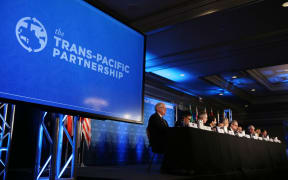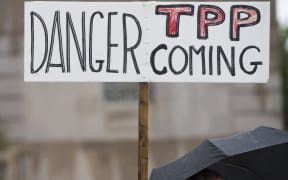The environment will suffer under the final text of the Trans Pacific Partnership (TPP), according to the Sustainability Council.

The Sustainability Council expressed particular concern about the possible impact of the TPP on efforts to reduce greenhouse gas emissions (file). Photo: AFP
The council has released a paper on the environment chapter of the agreement, as part of a series supported by a New Zealand Law Foundation grant.
More on the TPP
The paper said the impact from the agreement on the environment was even worse than expected.

Sustainability Council executive director Simon Terry Photo: SUPPLIED
The council's executive director, Simon Terry, said the text failed to protect the government from being sued by foreign investors if they believed that their future profits were at stake.
He said while there were provisions that protected governments from being sued for acting to reduce smoking, there were no similar protections for acting to protect the environment or tackle climate change.
That risk of being sued, according to Mr Terry, would have a chilling effect on a government's willingness to undertake environmental reform in the first place.
"They'll be much less willing to do that if they are concerned about being sued and that favours retaining low standards, when those standards need to rise markedly."
Mr Terry said the threat applied across all forms of environmental protection but the Sustainability Council was particularly concerned about the possible impact on action to cut New Zealand's greenhouse gas emissions.
The Investor State Dispute Settlement (ISDS) rules could be used to sue the government if increased emissions charges were levied under the Emissions Trading Scheme, he said - or if the mining of fossil fuels was restricted in some way.
He said when it came to commercial interests, particularly intellectual property, the text had very detailed requirements that applied across all the TPP partners, including new standards that needed to be adhered to.
However, for the environment chapter, there were remarkably few new standards of any form.
"The basic criteria for TPP governments is that they make their own laws, which can only be challenged under this agreement if they are laws which in any way affect trade, so it's not in any way the same degree of stringency or breadth of applicability."
Mr Terry said the TPP still had to run the gauntlet of the US Congress and there was no surety it would get approval - and it was a long way before New Zealanders needed to accept that the TPP was in place.
But, he said, it was important that people understood that major threats to the environment came along with trade gains.
Lawyers have put together a separate paper in this series on the ISDS chapter. The Sustainable Council said this work was used to inform its paper, which was peer-reviewed by University of Auckland senior lecturer in planning Prue Taylor.
RNZ has requested a response from the government.






